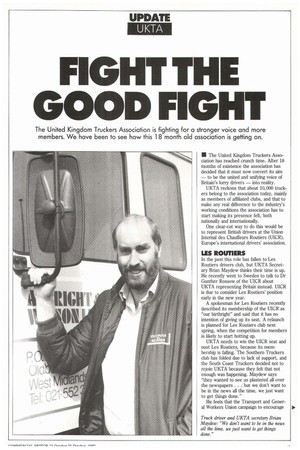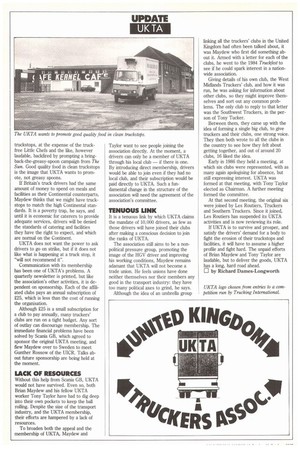FIGHT THE GOOD FIGHT
Page 43

Page 44

If you've noticed an error in this article please click here to report it so we can fix it.
The United Kingdom Truckers Association is fighting for a stronger voice and more members. We have been to see how this 18 month old association is getting on.
• The United Kingdom Truckers Association has reached crunch time. After 18 months of existence the association has decided that it must now convert its aim — to be the united and unifying voice of Britain's lorry drivers — into reality.
UKTA reckons that about 10,000 truckers belong to the association today, mainly as members of affiliated clubs, and that to make any real difference to the industry's working conditions the association has to start making its presence felt, both nationally and internationally.
One clear-cut way to do this would be to represent British drivers at the Union Internal des Chauffeurs Routiers (U1CR), Europe's international drivers' association.
US ROUTIERS
In the past this role has fallen to Les Routiers drivers club, but UKTA Secretary Brian Maydew thinks their time is up. He recently went to Sweden to talk to Dr Gunther Rossow of the UICR about UKTA representing Britain instead, UICR is due to consider Les Routiers' position early in the new year.
A spokesman for Les Routiers recently described its membership of the UICR as "our birthright" and said that it has no intention of giving up its seat. A relaunch is planned for Les Routiers club next spring, when the competition for members is likely to start hotting up.
UKTA needs to win the UICR seat and oust Les Routiers, because its membership is falling. The Southern Truckers dub has folded due to lack of support, and the South Coast Truckers decided not to rejoin UKTA because they felt that not enough was happening. Maydew says "they wanted to see us plastered all over the newspapers. . . but we don't want to be in the news all the time, we just want to get things done."
He feels that the Transport and General Workers Union campaign to encourage truckstops, at the expense of the truckfree Little Chefs and the like, however laudable, backfired by prompting a bringback-the-greasy-spoon campaign from The Sun. Good quality food in clean truckstops is the image that UKTA wants to promote, not greasy spoons.
If Britain's truck drivers had the same amount of money to spend on meals and facilities as their Continental counterparts, Maydew thinks that we might have truckstops to match the high Continental standards. It is a poverty trap, he says, and until it is economic for caterers to provide adequate services, drivers will be denied the standards of catering and facilities they have the right to expect, and which are normal on the Continent.
UKTA does not want the power to ask drivers to go on strike, but if it does not like what is happening at a truck stop, it "will not recommend it".
Communication with its membership has been one of UKTA's problems. A quarterly newsletter is printed, but like the association's other activities, it is dependent on sponsorship. Each of the affiliated clubs pays an annual subscription of 225, which is less than the cost of running the organisation.
Although 225 is a small subscription for a club to pay annually, many truckers' clubs are run on a tight budget. Any sort of outlay can discourage membership. The immediate financial problems have been solved by Scania GB, which agreed to sponsor the original UKTA meeting, and flew Maydew over to Sweden to meet Gunther Rossow of the UICR. Talks about future sponsorship are being held at the moment.
LACK OF RESOURCES
Without this help from Scania GB, UKTA would not have survived. Even so, both Brian Maydew and his fellow UKTA worker Tony Taylor have had to dig deep into their own pockets to keep the bail rolling. Despite the size of the transport industry, and the UKTA membership, their efforts are hampered by a lack of resources.
To broaden both the appeal and the membership of UKTA, Maydew and Taylor want to see people joining the association directly. At the moment, a drivern can only be a member of UKTA through his local club — if there is one. By introducing direct membership, drivers would be able to join even if they had no local club, and their subscription would be paid directly to UKTA. Such a fundamental change in the structure of the association will need the agreement of the association's committee.
TENUOUS LINK
It is a tenuous link by which UKTA claims the mandate of 10,000 drivers, as few as those drivers will have joined their clubs after making a conscious decision to join the ranks of UKTA.
The association still aims to be a nonpolitical pressure group, promoting the image of the HGV driver and improving his working conditions, Maydew remains adamant that UKTA will not become a trade union. He feels unions have done neither themselves nor their members any good in the transport industry: they have too many political axes to grind, he says.
Although the idea of an umbrella group
linking all the truckers' clubs in the United Kingdom had often been talked about, it was Maydew who first did something about it. Armed with a letter for each of the clubs, he went to the 1984 Truck fest to see if he could spark interest in a nationwide association.
Giving details of his own club, the West Midlands Truckers' club, and how it was run, he was asking for information about other clubs, so they might improve themselves and sort out any common problems. The only club to reply to that letter was the Southwest Truckers, in the person of Tony Tucker.
Between them, they came up with the idea of forming a single big club, to give truckers and their clubs, one strong voice. They then both wrote to all the clubs in the country to see how they felt about getting together, and out of around 20 clubs, 16 liked the idea.
Early in 1986 they held a meeting, at which six clubs were represented, with as many again apologising for absence, but still expressing interest. UKTA was formed at that meeting, with Tony Taylor elected as Chairman. A further meeting formed the committee.
At that second meeting, the original six were joined by Les Routiers, Truckers and Southern Truckers. Since it joined, Les Routiers has suspended its UKTA activities and is now reviewing its role.
If UKTA is to survive and prosper, and satisfy the drivers' demand for a body to fight the erosion of their truckstops and facilities, it will have to assume a higher profile and fight hard. The unpaid efforts of Brian Maydew and Tony Taylor are laudable, but to deliver the goods, UKTA has a long, hard road ahead.
by Richard Dames-Longworth




































































































